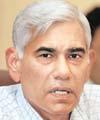 The Comptroller and Auditor General's report on the allocation of 2G spectrum is expected soon; the CAG is in the process of auditing the capital expenditure of Reliance Industries Limited's KG Basin gas fields. . .
The Comptroller and Auditor General's report on the allocation of 2G spectrum is expected soon; the CAG is in the process of auditing the capital expenditure of Reliance Industries Limited's KG Basin gas fields. . .
With over half the Plan funds that Parliament approves being spent through non-government channels, to cite the figure in CAG Vinod Rai's presentation to the Planning Commission, members of the Parliament have no way of knowing whether the money is properly spent.
Which is why the government is requesting the CAG to expand the scope of its audits to cover various private sector projects as well.
Rai spoke to Sunil Jain and Joe C Mathew to explain how the CAG plans to do the audits and dismissed fears that this could hurt their progress.
And no, he grins, he won't be looking for the fires behind all the smoke, only the big ones. Excerpts:
Why are you auditing PPP projects now?
I am not asking for an enlarged role; it is the government which is requesting the CAG to do the audits since it wants to give comfort to the MPs that the money is being well spent. Parliament votes for spending of resources.
I think, of the Plan of Rs 1,60,000 crore (Rs 1,600 billion), roughly Rs 83,000 crore (Rs 830 billion) is spent through non-government channels and this is audited by chartered accountants, but these reports are not presented to Parliament.
All I'm saying is that Parliament must have the right to oversight, and for that, it needs information.
When the CAG Act was passed in 1971, the model of governance was different -- you didn't have any non-government organisation, any civil society engagement or public private partnerships.
These new models of governance the world over have got reflected in the CAG Acts of many countries.
We are doing the same now.
In the case of projects like RIL's KG-D6 fields, the DGH has audited the costs anyway. . . .
The directorate general of hydrocarbons does not approve costs.
The costs are a function of a memorandum of understanding between the company and the ministry.
The DGH said the CAG had looked at the costs and this was seen to be incorrect. The government asked us to look at it and we will do it now.
The differences in the original and later capex figures were huge; then the government said it wanted independent experts to see if this was justified.
Therefore, you will now audit companies like DIAL all over again?
The Delhi International Airport Ltd, since you have mentioned the name, has a primary auditor, as does Oil and Natural Gas Corporation or Bharat Heavy Electricals Ltd, and I'm not going to replace that auditor.
I will do a supplementary audit and assuming I get different results, DIAL will get a chance to defend the original audit -- if I am not satisfied, DIAL will change its balance sheet.
This is the practice with public sector firms. There is no problem.
You will look at whether, for instance, a Rs 100-crore (Rs 1-billion) contract was given to the L1 bidder? L1 has been one of the biggest reasons that PSUs don't work as fast as private sector firms do.
Not unless the MoU/contract specifies that the bidder has to be the lowest or L1.
So what will you look at in a PPP project?
Let's say A has been given a 30-year road concession, and the projection was that there would be 100 cars on that road every hour -- now if the actual traffic is up to 200 cars, I'll do the calculations and suggest that the concession be reduced to, say, 22.
I will see if the transactions are with related parties. Each PPP has an agreement; my job is to audit whether that has been adhered to.
And what will you look at in the KG Basin?
I will look at costs. It will be audited all over again.
I will see if RIL has done the due diligence; I will look at the capex to see if it is justified; and I'll see whether all the costs can be loaded on to one project -- this applies to all projects, not just to KG-D6.
But doesn't this hinder functioning of companies? You know the saying about the 3Cs -- CBI, CVC and CAG -- and how this scares officials from even taking decisions?
How many officials of a PSU are behind bars or have had their ranks reduced or have had some sort of disciplinary action taken because of CAG reports?
All apprehensions should be based on facts.
The 3C fear is a bogey. I was in the defence ministry for five years and I bought equipment that was not always the lowest, or L1.
All that the CVC/CAG wants is justification saying I was buying Tank X or Gun Y because the L1 bidder's equipment didn't meet my requirements. The fear of the CAG is used as an excuse to not take decisions.
Your guidelines for auditing PPPs talk of looking at whether getting a private firm in is justifiable. This is frightening.
A fortnight ago, the defence ministry press release said it wanted to manufacture six submarines in the public sector shipyards like Mazagaon and three in the private sector. Why?
Because the ministry did due diligence and found that PSU shipyards cannot do more than six in a time frame.
The navy said it needed nine, so three had to be done in the private sector. I just want to see if the due diligence has been done.
In the case of an airport, the government may say that the Airports Authority of India would have taken too long -- this is justifiable.
All I'm saying is that you need to have a checklist for due diligence and this has to be followed.
The CAG wants to engage with the government. I have been doing outcome audits for government projects.
So, if the government says it wants to build a world-class airport and so needs to give the concessionaire concessions, I want to see how much of this is justifiable.
We have an entry conference when we start a performance audit to explain the audit process.
Then there is an exit conference after the audit where we present our report and take into account clarifications/objections.
I will share our observations with the government before finalising it.
Let's assume you find huge problems in a PPP project and you present your report to the government. What then? In the case of the VDIS tax amnesty scheme, the Delhi Vidyut Board privatisation, and a lot more, you pointed out huge lacunae, but the government didn't act on your suggestions.
Our job is to do the audit and present it to the government. Once we engage with the government, and the government reads our report, the idea is mainly to ensure the same problem does not get repeated.
When we did an audit of MNREGA, the then rural development minister was very positive and accepted a lot of our suggestions to plug the loopholes.
One change we have made is that now we also highlight the positives of programmes. Let's say we find that certain aspects of MNREGA are being implemented very well in Maharashtra.
We will highlight this as a model for others to copy in our reports.
What expertise do you have in auditing something like KG-D6 or DIAL? How do you know what expenditure is required and what is not?
Training and retraining is the single biggest activity for me since my resource is human capital.
At any point in time, at least a staff of 100 is training. I'll tie up with the CAG of Oman, for instance, and he'll put my people in oil companies there to learn about the sector.
I do not have officials who are experts in atomic energy or petroleum exploration, but officers undergo rigorous and continuous training in these areas when required to audit a particular sector.
Before the KG audit, I sent my people for training, hired consultants and so on. I also have specialised centres like the one in Noida on IT audit -- we're world leaders in this now.
We are setting up a centre for environmental audit in Jaipur and have people like Sunita Narain and R K Pachauri associated with it.
A common feature, increasingly, of PPPs is that they give large post-bid concessions or make changes in the contractual framework. In some other cases, you find concessions being offered just before the financial bids, by which time most of the original bidders have walked away. Will you look at this aspect in your audits?
Let's see. If it is really big and the government or the public or the media thinks there is a problem . . . There is no smoke without a fire, but we won't look every time there's some smoke, we'll concentrate on the big smoke!
Image: Vinod Rai. | Photograph, courtesy: Business Standard









 © 2025
© 2025